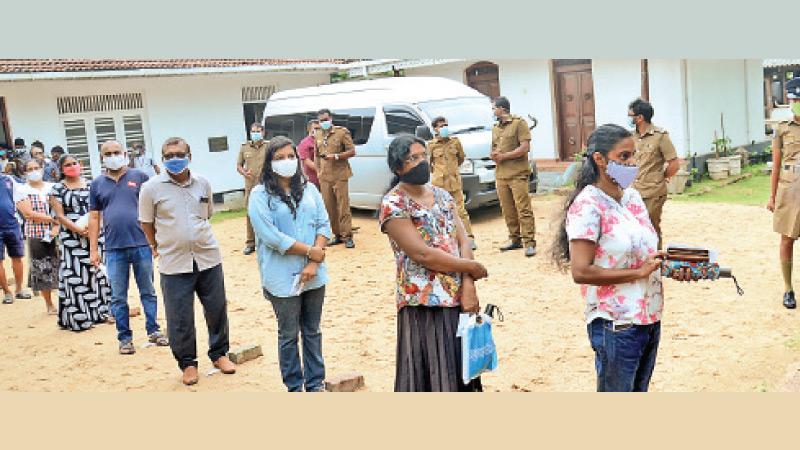
As Wednesday, August 5 morning dawned to grey skies and drizzle, there was enthusiasm written on the peoples’ faces, (those ones who were seen already out) and about by 6.30 a.m., this enthusiasm was clearly comprehensible.
The country has maintained an average of over 70 per cent voter turnout during past elections. And a pandemic was not to deter the voters from exercising their right. This Parliamentary election garnered global attention for being the first major election that was held amid a pandemic in South Asia.
This was mostly thanks to the strict health precautionary measures adopted by the Election Commission (EC) to ensure that there was minimum possibility of the virus spreading among the voters and election officials.
Health precautions
Voters were encouraged to bring their own pens, maintain social distancing and wear a mask at all times during the voting period. Hand sanitisers were made available at most polling booths and at others soap and running water. A plastic screen separated the voters from the polling agents who used a paper napkin to touch voter’s hand as they marked the finger with a disposable stick dipped in ink. An ink-marked finger was a testimony many voters proudly displayed on their social media sites.
 Most shops in the city of Colombo remained closed as migrant workers, the backbone of the commercial city’s economy, returned to their hometowns to exercise their franchise. In Piliyandala, a suburb of Colombo, voters stood in lines.
Most shops in the city of Colombo remained closed as migrant workers, the backbone of the commercial city’s economy, returned to their hometowns to exercise their franchise. In Piliyandala, a suburb of Colombo, voters stood in lines.
“I have always voted during every election. I was confident to come out and vote today because I am satisfied about the way the Government has managed the pandemic,” 68-year-old W. Wanigasooriya said.
He added that this shows that President Gotabaya Rajapaksa is capable of managing the country and this gives him confidence that the future of his children are in the right hands.
Wanigasooriya is among the voters who made up to 71 per cent, of the 16.2 million, voter turnout on Wednesday. The turnout of the 2015 Parliamentary election was 76 per cent.
This time, 7,452 candidates from 40 political parties and 312 independent groups campaigned for 196 seats in Parliament. Twenty nine seats were filled through the National List.
Landslide victory
The Sri Lanka Podujana Peramuna (SLPP) scored an landslide victory at the Parliamentary election securing 59.09 per cent of the electoral votes. The party has a clear majority of 145 seats in Parliament. The United National Party’s breakaway group, the Samagi Jana Balawegaya came second with 54 seats.
Indian Prime Minister Narendra Modi was one of the first world leaders to congratulate the new government.
“We will work together to further advance all areas of bilateral cooperation and to take our special ties to ever newer heights,” he said in a tweet addressed to soon to be re-appointed Prime Minister, Mahinda Rajapaksa.
In its congratulatory statement the U. S. Embassy stated, “the United States congratulates Sri Lanka on conducting the elections in a peaceful and orderly manner despite the challenges posed by the Covid-19 pandemic.
“As the new Parliament convenes, we hope the Government will renew its commitments to building an inclusive economic recovery, upholding human rights and the rule of law, and protecting the country’s sovereignty. We look forward to partnering with the Government and new Parliament.”
The results were announced in the wee hours of Friday, August 7. Therefore, 33-year-old N. Nilanthi had no idea that the party she was rooting for would obtain an easy victory when she went to vote on Wednesday morning.
“The country is already disciplined and there is no chance for drug dealers under this government. We need a leader like the President,” Nilanthi said.
However, 34-year-old Hasantha Kosala from Borelesgamuwa wasn’t as confident. He expressed doubts about how the Government has handled the economic issues faced by Covid-19 hit businesses.
Kosala also applauded the steps taken by the EC to make the election process safe for everyone. Earlier, he was scared to come to vote but when he came to the polling booth, he saw that the EC had taken steps to combat the spread of the virus.
 EC Chairman, Mahinda Deshapriya even went to vote on Wednesday, according to him after nine years, to set an example to any voters who doubted that they were safe.
EC Chairman, Mahinda Deshapriya even went to vote on Wednesday, according to him after nine years, to set an example to any voters who doubted that they were safe.
“Following my appointment in 2011, this is the first time I came to the polling station as a voter,” Deshapriya said.
According to People’s Action for Free and Fair Elections (PAFFREL) on Election Day there were 147 election law violations, and on Thursday evening there were 10 violations reported.
The only major incident during this election was reported from Jaffna where the police and STF were deployed to disperse an agitated crowd.
The Centre for Monitoring Election Violence (CMEV) sources said that during the clash that took place outside the Jaffna Central College counting centre, the counting process was stopped. The results were later released.
The clash occurred when a group of supporters of a candidate accused another of rigging the election process.
